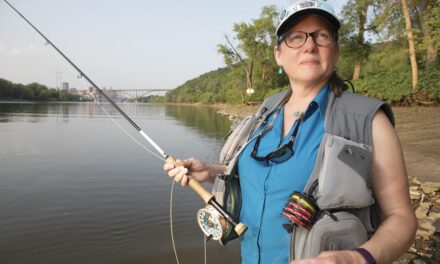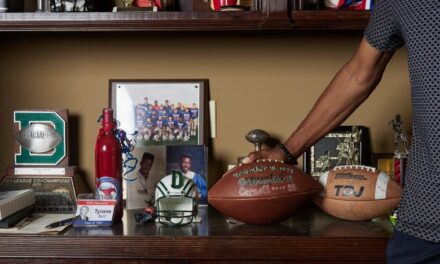“It’s remarkable,” Edmund White, the acclaimed queer novelist memoirist, playwright, biographer and essayist, told the Blade this summer in a telephone interview, “I’m 83 years old! A lot of people my age would give up.”
“Not me,” he added, “I still feel sharp.”
White, born in 1940, is more than as good as his word. At a time of life when many rest on their laurels, he has not only published his latest novel, “The Humble Lover,” (Bloomsbury), but is working on new literary projects.

Don’t be fooled by White’s age. “The Humble Lover” is no sleepy, “octogenarian” novel. Yes, its protagonist, Aldwych West, who’s desperately in love with 20-year-old August Dupond, a principal dancer in the New York City Ballet, sleeps. But that’s all “The Humble Lover” has in common with staid novels for “the elderly.” The novel features lots of sex, unrequited passion, ballet, Champagne, and Ernestine, a dominatrix, who makes Joan Crawford or Bette Davis at their bitchiest seem tame. August doesn’t return Aldwych’s affections. In an effort to spike August’s interest, Aldwych, who’s incredibly wealthy, creates a ballet company so August can have his own ballet troupe to star in. Poor Aldwych! August still doesn’t lust for him. Instead, he hooks up with Padro, a sex worker, and Ernestine, who’s married to his investment banker nephew Bryce. It’s deliciously wicked.
“Why don’t they have more gay villains,” White said, “I liked writing Ernestine. She’s a real bitch!”
“The Humble Lover” is one of the more than 30 novels that White has written. To say that White, who grew up in Evanston, Ill., has had a creative and productive life is an understatement. White, who lives in New York, was a co-founder of the Gay Men’s Health Crisis and of the 1980s queer writers group The Violet Quill. In addition to his many novels, he has written memoirs, essay collections, book reviews as well as biographies of Rimbaud, Genet, and Proust. White wrote a novel (unpublished) when he was a teen at Cranbrook School, a boarding school in Broomfield Hills, Mich.
White has received more honors than you could imagine. His many awards include the PEN/Saul Bellow Award for Career Achievement in American Fiction and Lambda Literary’s Visionary Award.
The National Book Foundation presented White with the 2019 Medal for Distinguished Contribution to American Letters. “A master of narrative and craft across fiction, journalism, memoir and more,” David Steinberger, chair of the board of directors of the Foundation said of White. “Whether it’s evocative depiction of gay life during the tumultuous 1980s, painstakingly researched biography or elegant memoir, White’s work stands out across decades as its resonance … for a multitude of devoted readers.”
Along with being a legendary queer literary lion, White is professor emeritus of creative writing at Princeton. (He taught at Princeton for 19 years.) White has been called the “godfather of gay American literature,” Princeton Alumni Weekly has reported.
In 2013, White and the writer Michael Carroll, who is 25 years younger than White, were married. White has lived much of his life in New York and Paris.
From early on, White was imaginative. As a child, White, like many writers thought up stories and had imaginary friends. “One of my imaginary friends was named Cottage Cheese,” White said.
Today, White is one of the most out, unabashedly, joyfully queer people you’d ever want to meet. “I’m working now on a sex memoir about the loves of my life,” White, who in 1977 co-wrote with Charles Silverstein, “The Joy of Gay Sex,” said.
“It’s so much more sex positive now,” he added.
But when White grew up in the Midwest in the 1940s and 1950s, there was nothing sex positive about being queer. Being gay was sinful and illegal. At best, it was believed to be a sickness. In that era, “the three most heinous things in America were heroin, communism and homosexuality,” White wrote in an essay.
White knew he was queer early on (even though he secretly perused the dictionary to find words for his feelings).
In his 2018 memoir “Unpunished Vice: A Life of Reading,“ White recounts that, when he was 12, his mother gave him a biography of Nijinsky, the queer Russian ballet dancer. “Was it just that he was an iconic artist…and she wanted to stoke my artistic fires,” he writes, “Or was it innocent compliance with a sissy streak I’d already manifested?”
When he was a teen and underage, men would come by, cruising, in their cars. He’d have sex with them. But, “I was jailbait,” White said, “they’d never meet me a second time.”
White always wanted to be a writer. “But, I knew writers can’t support themselves,” White said, “so I thought, maybe I’ll be a professor.”
At boarding school, White’s favorite teacher had studied Chinese. White decided to follow in his footsteps. In 1962, he graduated from the University of Michigan, where he studied Chinese. White was accepted into Harvard University’s doctoral program in Chinese. But he decided against entering the program. He opted to follow a lover and move to New York.
For several years, he pursued journalism. Working for Time-Life Books, freelancing for Newsweek, editing the Saturday Review and Horizon as well as freelancing for publications such as The New Republic.
White is best known for his trio of autobiographical novels: “A Boy’s Own Story,” “The Beautiful Room Is Empty” and “The Farewell Symphony.”
But not all of his fiction, especially, his most recent novels (such as “A Previous Life” and “A Saint from Texas”) are about his life.
“I got tired of writing autobiographical fiction,” White said, “I enjoy making people up.”
White talked enthusiastically about creating “The Humble Lover.” “When I was in my 20s, I had an affair with a well-known ballet dancer,” White said, “and I’ve always been fascinated by the ballet.”
His fascination with ballet and his acquaintanceship with wealthy, WASPy people helped him to imagine the characters in “The Humble Lover.”
“I had an office mate who was the ultimate WASP from a good family in New York City,” White said. “They had their own brownstone. He’d gone to Harvard. He had a way of pronouncing words that was different from anybody else.”
White, like an anthropologist, studied him. “He became the basis for Aldwych,” White said.
Part of writing for White is finding characters equivalent to people in your life. “When I worked for Vogue magazine, I met a lot of society people,” he said. “They interest me in an anthropological way.”
“I had a boyfriend who was on the best-dressed list,” White added, “these jet set people talk all the time about their schedules.”
At the same time, White thinks people spend too much time thinking about celebrities. “They’re not that interesting,” he said.
In addition to working on a memoir about sex, White is writing a new novel. The novel, White said, is based on his nephew who killed himself at age 50. “It was 10 years ago. He was hetero and lived with me for a little bit,” White said. “He was a little bit crazy. He wouldn’t stay on lithium. I was very close to him.”
“I’ve always wondered if I could find a way to do it,” White added.
Before Stonewall, queer writers would try to explain LGBTQ people to readers. “Or they would try to get compassion for gays and present us as sick in sad stories,” White said. “Or, as in Gore Vidal’s case, they’d show us as campy.”
It’s very different, today. “It’s sex positive.” White said.
The Blade may receive commissions from qualifying purchases made via this post.




